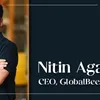Roll-up ecommerce: How Powerhouse91 enables brands to grow multifold and become profitable
Powerhouse91, backed by Titan Capital and US-based Crossbeam Venture Partners, operates brands across three different categories - personal care, sports & fitness, and general wellness, with each of them projected to become multi-million dollar businesses over the next year.
Ecommerce is India has come a long way - from select random sellers on platforms to direct to consumer being the norm du jour for brands.
Shashwat Diesh (30), Aqib Mohammed (28), and Nikhil Agrawal (38) strongly felt the next wave in ecommerce was all about consolidation, shared resources, and shared economy - which has lent a buzz around the term roll-up ecommerce in India.
And with this in mind, they started Powerhouse91 earlier this year. The firm buys ecommerce brands and operates them as their own to “take them to the next level”. The model is akin to US-based Thrasio, which started in 2018, and in less than four years, stands at a valuation of $4 billion.
Started in February this year, has forayed into three categories already - personal care, sports & fitness, and general wellness, and has grown the team to 26 employees. The Gurugram-based startup has also raised an undisclosed amount of seed funding from Titan Capital and US-based Crossbeam Venture Partners, and aims to expand significantly in the near future.
How it started
Shashwat and Aqib met as colleagues at Snapdeal in 2015, where they got a thorough understanding of the ecommerce landscape. The enterprising duo soon started a venture together with sanitary napkins brand, Azah.
"With Azah, we understood what it actually takes to build something from zero to one. From delivering the first few shipments to dealing with big ecommerce platforms, from inventory to supply chain, the challenges were plenty on a day-to-day basis,” says Aqib.

Aqib Mohammed and Shashwat Diesh
He adds that 2020 became more complex due to the pandemic, and while the duo managed to get it right, they realised that fellow ecommerce brand owners were not as lucky.
“Setting up and building an ecommerce brand has some inevitable challenges associated with it, like running out of stock, rising inventory costs, uncertainty, advertising, marketing, rising competition, etc,” adds Aqib.
The duo felt that they could solve these problems for other brands by applying the same set of solutions they developed for Azah.
Nikhil, who was working at OYO as Head of Strategic Finance, also joined the team, and Powehouse91 was started in February 2021, with operations going full swing in May. Azah is now a member brand of Powerhouse91.
The founders claim the company has developed deep optimisations across marketing, supply chain, and product development, thanks to its operations-first approach and expertise.
When asked how they go about selecting a brand, Aqib says the company evaluates its potential. “We look at fast-growing evergreen categories doing at least Rs 100+ crores in online GMV each, with further acquisitions and product launches across emerging categories such as home & kitchen, gardening & outdoors, and personal care to name a few. While the company is flexible in terms of revenue size and category of the brand for its acquisitions, product quality and genuine customer love are the most critical factors in Powerhouse91's decision-making process,” he adds.
Business model and growth
Powerhouse91 runs on a simple revenue model. It acquires or buys the brands and pays the owner the buying price along with other deals, which varies transaction to transaction. “We grow the brands, and we recover the value we invested in the brands,” tells Aqib. He says that while it is too early to speak about Powerhouse91’s own revenue at this point, it is worth noting that all the brands it has acquired are profitable already.
Market and competition
According to a report by Avendus Capital, the pandemic has accelerated the uptake for D2C brands, with an almost 88 percent rise in demand over 2019. The D2C sector in India is worth $44.6 billion (end of FY 2021), and is expected to be worth $100 billion by 2025. In terms of competition in the roll-up ecommerce space, Ananth Narayanan, Myntra’s former CEO, and First Cry’s Supam Maheshwari are leading the charge in India. While Ananth founded Mensa Brands, Supam’s GlobalBees raised a big Series A funding of $150 million in July this year.
Recently, Walmart-owned ecommerce giant Flipkart also launched ‘Flipkart Boost’, an integrated, service-fee based programme for D2C brands, which is a similar model. Some of the startups in the space are 10Club, GOAT Brand Labs, EvenFlow, and Upscalio.

Referring to competition, Aqib says ecommerce has matured hugely in India as well as globally, which has resulted in a plethora of D2C brands or private label brands delivering really good quality products and developing an identity of their own. “But, they lack marketing budgets, distribution leverage, and many other things. Hence, the next stage of the evolution of ecommerce is brand aggregators. The next wave of growth in ecommerce is value creation that will directly come through these consolidations,” he adds.
“One of the differentiating aspects about Powerhouse91 compared to other ecommerce roll-up companies is that it was started by people who have themselves gone through the journey of building consumer brands doing multiple crores in revenue within a year of its inception. Guided by the same operations focussed work culture, Powerhouse91 has built multiple proprietary tools, growth frameworks and business processes to help any acquired brand grow 15-20x over the next five years while maintaining healthy profitable margins,” says Aqib.
Funding and plans
Powerhouse91 is backed by Titan Capital and US-based Crossbeam Venture Partners. The founders do not want to disclose the amount raised, but said that the company’s model is capital intensive and funds are fuel to the company.
According to Aqib, the startup aims to invest significantly in product research and development over the next few years, and continue acquiring high-potential consumer brands across the different categories.
“We want to add four more categories across home fitness equipment, personal care, therapeutic products, physiotherapy products etc,” says Aqib.
YourStory’s flagship startup-tech and leadership conference will return virtually for its 13th edition on October 25-30, 2021. Sign up for updates on TechSparks or to express your interest in partnerships and speaker opportunities here.
For more on TechSparks 2021, click here.
Edited by Anju Narayanan









